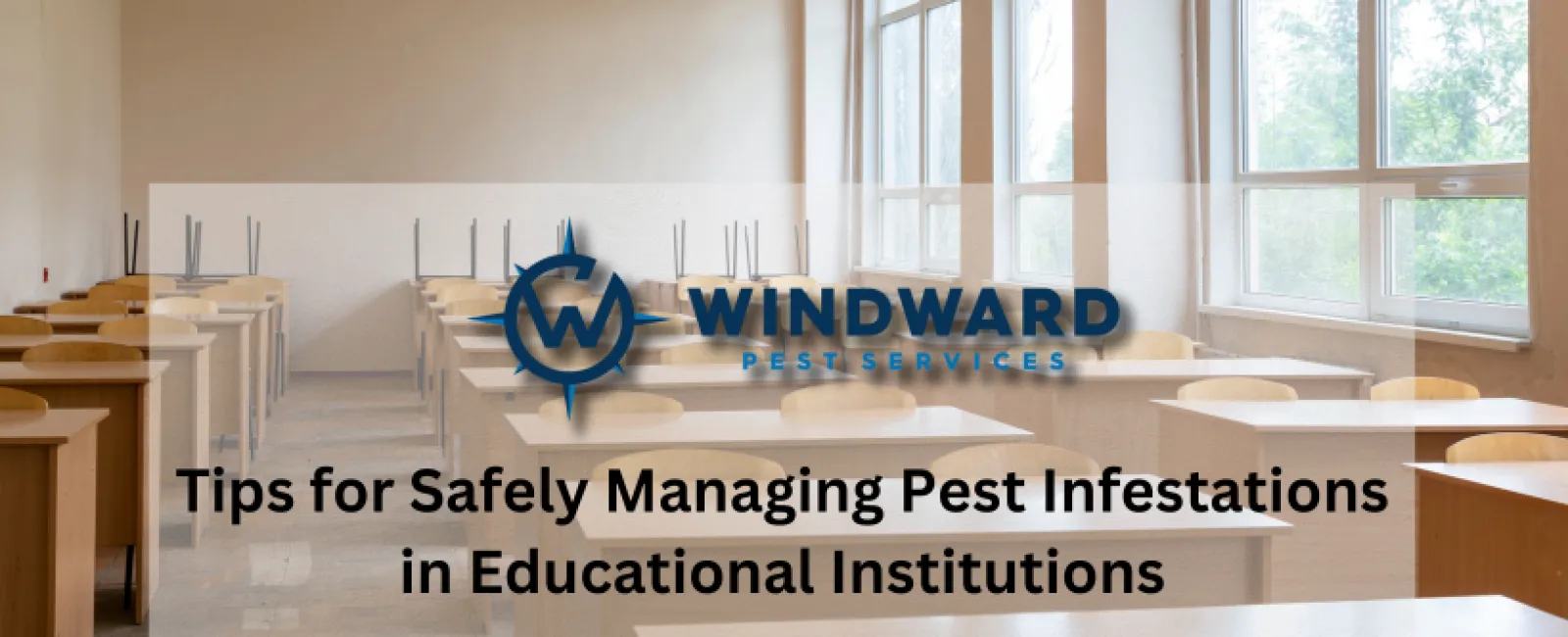Educational institutions, such as schools and universities, play a pivotal role in shaping the future, serving as spaces for learning, growth, and development. However, these environments can also be vulnerable to pest infestations due to their size, frequent human activity, and complex infrastructure. In cities like Atlanta, where schools often house hundreds or even thousands of students and staff, maintaining a safe, pest-free environment is essential. Effective pest management requires a multifaceted approach, combining preventive measures, early detection, and targeted treatments.
At Windward Pest Services, we understand the critical importance of maintaining educational spaces free from pests. Whether it's through comprehensive Atlanta pest control or our tailored Atlanta interior and exterior pest treatments, ensuring the health and safety of both students and staff is our top priority. Left unchecked, pests in schools can cause serious health hazards, trigger allergic reactions, or even cause structural damage to the facility. This blog provides essential tips for schools, universities, and daycare centers to manage pests effectively, while minimizing risks to human health and the environment.
In this article, we will explore various strategies that educational institutions can adopt to prevent pest infestations and manage existing problems safely and efficiently. Whether you're looking to implement routine Windward Pest Services pest inspections or are in need of specialized Atlanta residential and commercial pest services, these guidelines will help you create a healthier, more secure learning environment.
Common Pests in Educational Institutions
Before diving into management tips, it's crucial to understand the types of pests that commonly infiltrate educational facilities. In Georgia, some of the most common pests include:
Rodents (Rats and Mice): These pests are drawn to the abundance of food waste and shelter provided by school buildings. Rodents pose significant health risks by spreading diseases such as hantavirus and salmonella, and they can damage property by gnawing on electrical wiring, books, and furniture.
Cockroaches: Cockroaches are notorious for their resilience and ability to hide in small spaces. Their presence can exacerbate asthma and allergies, especially among children. Cockroaches often thrive in food preparation areas and garbage disposal zones.
Ants: Ant colonies, particularly those of fire ants and carpenter ants, can disrupt the daily functioning of schools. Fire ants can be dangerous to students due to their painful stings, while carpenter ants can compromise the structural integrity of school buildings.
Flies: Flies are not only a nuisance but can also transmit harmful bacteria, potentially contaminating food and surfaces in cafeterias or dining halls. In some cases, the presence of flies indicates other sanitation problems within the school.
Spiders: Though most spiders in Georgia are harmless, the presence of venomous species such as the black widow or brown recluse can create serious safety concerns in educational facilities.
Tips for Preventing and Managing Pest Infestations in Schools
Implement Routine Pest Inspections. Regular pest inspections should be a cornerstone of any educational institution's pest management plan. By scheduling comprehensive Windward Pest Services pest inspections, schools can identify potential pest issues before they become full-blown infestations. Inspections should cover both interior and exterior areas, including kitchens, cafeterias, classrooms, and playgrounds.
Keep School Grounds Clean and Tidy. One of the simplest yet most effective ways to prevent pests is by maintaining cleanliness throughout the school. Educational institutions should emphasize regular cleaning routines, particularly in areas where food is prepared and consumed. Trash bins should be sealed tightly, and food waste should be promptly disposed of to eliminate potential attractants for pests such as rodents and cockroaches.
Seal Cracks and Entry Points. Many pests find their way into school buildings through cracks, gaps, and openings in walls, windows, and doors. Sealing these entry points can significantly reduce the likelihood of pests gaining access. Schools in Atlanta, in particular, should focus on securing entryways to prevent local Georgia pests from invading the premises.
Use Non-Toxic Pest Control Methods. When dealing with pest infestations in educational institutions, it's important to choose treatments that prioritize the safety of students and staff. Non-toxic pest control solutions, such as bait stations and insect growth regulators, can effectively target pests without exposing the school community to harmful chemicals. Atlanta interior and exterior pest treatments from Windward Pest Services offer a range of eco-friendly options for educational facilities.
Maintain Proper Food Storage Practices. Pests are often attracted to food sources, making cafeterias and food storage areas a hotspot for infestations. Schools should store food in airtight containers and ensure that all kitchen appliances are regularly cleaned to prevent buildup of crumbs and grease, which can attract pests like ants and cockroaches.
Educate Staff and Students. Prevention is key, and educating both staff and students on best practices for pest prevention can go a long way. Teachers, custodians, and kitchen staff should be trained to spot early signs of pest infestations and report them immediately. Additionally, schools can implement educational programs for students, encouraging them to practice cleanliness in common areas.
Maintaining a pest-free environment in educational institutions is critical to the health and well-being of students, teachers, and staff. Whether it's addressing immediate infestations or implementing long-term prevention strategies, Windward Pest Services is committed to providing reliable Atlanta residential and commercial pest services. By combining routine pest inspections with proactive measures like sealing entry points, maintaining cleanliness, and opting for eco-friendly treatments, schools can effectively manage pests and create a safe learning space.
Additionally, educating staff and students about pest prevention can enhance the effectiveness of pest management programs. Training sessions on recognizing early signs of pest activity and maintaining cleanliness can empower everyone in the institution to contribute to a pest-free environment. By fostering a culture of awareness and responsibility, schools can further reduce the risk of infestations and ensure a healthier atmosphere for learning.
If you're looking for professional assistance, consider scheduling a Windward Pest Services pest inspection. Our Atlanta pest control experts specialize in interior and exterior pest treatments tailored to the specific needs of Georgia schools. Don't let pests compromise the safety and functionality of your educational facility—reach out to us today for a consultation.

